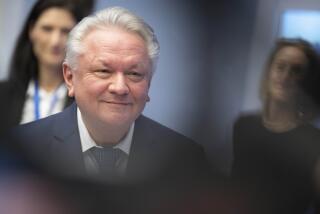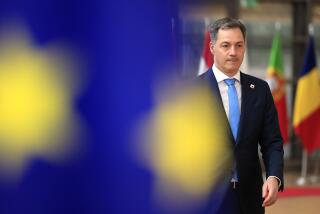Covert Activity by U.S. Called No Big Secret
- Share via
PARIS — A European senator leading a probe into alleged CIA abductions of suspected terrorists asserted Tuesday that European governments were most likely aware of clandestine U.S. activity on their soil, but he said he had not found proof of secret detention centers in Poland and Romania.
In a report to the Council of Europe, a legislative assembly based in Strasbourg, France, Swiss Sen. Dick Marty presented interim findings of a 2-month-old inquiry that is worsening transatlantic tensions over tough U.S. tactics against terrorism.
“Rendition affecting Europe seems to have concerned more than a hundred persons in recent years,” Marty said. “Hundreds of CIA-chartered flights have passed through numerous European countries. It is highly unlikely that European governments, or at least their intelligence services, were unaware.”
European anti-terrorism agencies are suspected of assisting or permitting some surreptitious U.S. “extraordinary renditions” of suspects who were later allegedly tortured in Arab countries, Marty and others say. Moreover, critics say the European indignation rings hollow because law enforcement and intelligence agencies in Europe have received information gained during interrogation of Al Qaeda figures held in U.S. custody at secret sites.
Although Marty’s inquiry has no judicial powers, it has become a conduit and catalyst of increasing backlash against a shadowy U.S. counter-terrorism campaign. Many Europeans see accounts of renditions and torture, and the legal limbo of the U.S. detention facility at Guantanamo Bay, Cuba, as signs of a war run amok. In more than a dozen countries around Europe, law enforcement authorities and legislatures have opened investigations into suspected CIA abductions, detention facilities and flight stopovers.
“These abductions are criminal acts that are against the laws of all civilized countries,” Marty said during a news conference.
In response, U.S. leaders have said they respect the laws and sovereignty of foreign nations, language interpreted by some observers as an indication that European intelligence agencies had given the CIA tacit approval.
In an interview during a visit to Paris on Tuesday, Homeland Security Secretary Michael Chertoff said he had not seen Marty’s report. He said he hoped the debate and the focus of some European law enforcement on alleged U.S. misconduct would not damage cooperation against a shared threat.
“Obviously, the authorities are free to investigate whatever they want to investigate,” Chertoff said. “But we should not allow ourselves to be distracted from the need to identify, prevent and protect against terrorist acts of violence which could cause a lot of innocent people to lose their lives.”
Marty’s interim report drew partly on two well-documented judicial investigations. In Italy, prosecutors have charged 22 people identified by authorities there as CIA operatives with snatching a militant imam and flying him to Egypt to be tortured. In Germany, authorities are investigating the case of a Lebanese-born German citizen who accuses American agents of spiriting him from Macedonia to an Afghan interrogation facility, then releasing him after five months when they realized they had the wrong man.
The report also cites a case in which Swiss spies intercepted a fax from Egyptian diplomats in Cairo to the Egyptian Embassy in London making apparent reference to U.S.-run detention facilities in Eastern Europe. The group Human Rights Watch has alleged that secret CIA sites operated in Romania and Poland. Those governments have opened investigations. The issue of CIA sites in Eastern Europe first surfaced in a report in the Washington Post in November.
But Marty said he had not turned up any “formal, irrefutable evidence of the existence of secret CIA detention centers.” His search will now turn to analysis of satellite images of Romanian and Polish military bases, pictures that were provided to him by European Union agencies only Monday, he said.
During debate in Strasbourg on Tuesday, some legislators faulted Marty for relying heavily on media reports. And critics said the European Parliament had limited political powers, checkered credibility and a reputation for anti-Americanism.
British legislator Dennis McShane said the report had “more holes than Swiss cheese.”
More to Read
Sign up for Essential California
The most important California stories and recommendations in your inbox every morning.
You may occasionally receive promotional content from the Los Angeles Times.










